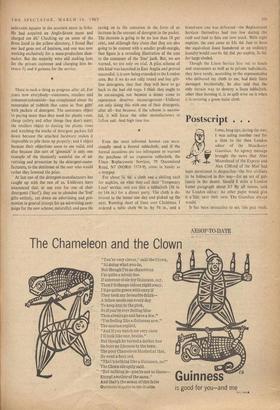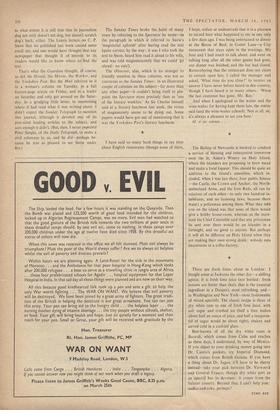Postscript • •
.0Nu, long ago, during the war, was acting number two for a time to the then London editor of the Manchester • Guardian. An agency message brought the news that Alan Moorehead of the Express and Alex Clifford of the Mail had been mentioned in despatches—Abe first civilians to be honoured in this way—for an act of gal- lantry in the desert Should I Write a London Letter paragraph about it? By all means, said the London editor: no other paper would give it a line, save their own. The Guardian always would.
It -has been instructive to see, this past week, to what extent it is still true that in journalism dog not only doesn't eat dog, but doesn't scratch dog's back, either. The Leavis lecture on C. P. Snow that we published last week caused some small stir, and one would have thought that any newspaper that thought it of interest to its readers would like to know where to find the .text.
That's what the Guardian thought, of course, as did the Herald, the Mirror, the Worker, and the Yorkshire Post. But the Mail referred to it in a woman's column on Tuesday, in a full feature-page article on Friday, and in a leader on Saturday and only got around on the Satur- day, in a grudging little letter, to mentioning where it had read what it was writing about. I didn't expect the Sunday Telegraph to mention this journal, although it devoted one of its pint-sized leading articles to the subject, and sure enough it didn't. (But, then, I never expected Peter Simple, of the Daily Telegraph, to make a civil reference to us, and he did—perhaps be- cause he was so pleased to see Snow under fire.) The Sunday Times broke the,habit of many years by referring to the Spectator by name—in the paragraph in which it referred to Snow's 'magisterial aplomb' after having read the text (quite correct, by the way: it was I who took the text to Snow, heard him read it aloud to his wife, and was told magnanimously that we could 'go ahead: no cuts').
The Observer, alas, which is no stranger to friendly mention in these columns, was not so courteous as the Sunday Times: in an illustrated couple of columns on the subject—far more than any other paper—it couldn't bring itself to pin- point the Spectator more precisely than as 'one of the literary weeklies.' As Sir Charles himself said at a literary luncheon last week, the virtue of magnanimity seems to be dying out. Some papers would have got out of mentioning that it was the Yorkshire Post's literary luncheon.
* I have said so many hard .things in my time about English restaurants (though none of them, Ihope, unfair or undeserved) that it is a pleasure to record here what happened to me in one only a few days ago. I was being entertained to dinner at the Baron of Beef, in Gutter Lane—a City restaurant that stays open in the evenings. My host and I had much to talk about, and went on talking long after all the other guests had gone, our dinner was finished, and the bar had closed. Remembering that the restaurant does not claim to remain open late, I called the manager and asked, 'What time do you close?' to receive an answer I have never before heard in this country, though I have heard it in many others: 'When the last customer has gone, Mr. Ray.'
And when I apologised to the waiter and the wine-waiter for having kept them late, the waiter said (and the wine-waiter echoed), 'Not at all, sir, it's always a pleasure to see you here.'
0, Si sic otnnes . . .
The Bishop of Newcastle is booked to conduct a service of blessing and intercession tomorrow over the St. Aidan's Winery on Holy Island, - where the islanders are proposing to brew mead and make a local liqueur. This should be quite an addition to the island's amenities, which in- cluded, when I was last there, four public houses —the Castle, the Crown and Anchor, the North- umberland Arms, and the Iron Rails, all run by relatives of each other—to only two hundred in- habitants, and no licensing laws, because there wasn't a policeman among them. What they told you on the island was that none of them would give a bobby house-room, whereas on the main- land the Chief Constable said that any policeman he sent over there would be an ,islander in a fortnight, and no good to anyone. But perhaps it will all be different on Holy Island when they are making their own strong drink : nobody eats sweetmeats in a toffee-factory.
There are fresh limes about in London: I bought some at Jacksons the other day—a shilling apiece. It is fresh lime juice (not bottled: fresh lemons are better than that), that is the essential ingredient in a Daiquiri, most refreshing, and— in Washington and New York—most fashionable of mixed aperitifs. The classic recipe is three of dry white rum to one of fresh lime juice, with soft sugar and crushed ice (half a lime makes about half an ounce of juice, and half a teaspoon- ful of sugar would be about right), shaken and served cold in a cocktail glass.
Best-known of all the dry white rums is Bacardi, which comes from Cuba and reaches us these days, I understand, by way of Mexico. If you object to your drinking money going into Dr. Castro's pockets, try Imperial Diamond, which comes from British Guiana. If you have a thing about Dr. Jagan, it'll have to be sherry instead—take your pick between Dr. Verwoerd and General Franco, though dry white port as an aperitif has its devotees: it comes from the Salazar country. Beyond that, I can't help you: vodka-and-coke, perhaps?
CYRIL RAY



































 Previous page
Previous page